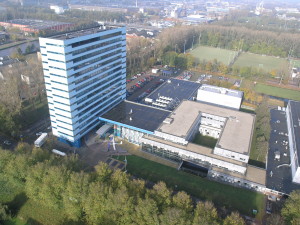Delft Cybernetics
Delft Cybernetics is a research group that is part of the Control & Simulation section at TU Delft’s Faculty of Aerospace Engineering. Our group consists of a number of enthusiastic researchers who aim to develop objective and quantitative methods for measuring, modeling, and comparing human control behavior. In addition, we work on various cross-disciplinary applications that aim at better supporting humans in direct control of technical systems and vehicles.
Contrary to popular belief, in most safety-critical flight scenarios it is not the on-board computers, but human pilots who have to control their aircraft. Certainly, it is technically feasible to design and implement automation for performing precise computer-controlled landings, upset recoveries, and control corrections after damage is taken, without the need for any pilot action. However, the inherent unpredictability of risk factors such as weather and extreme certification costs prevent such automatic systems to be certified. This means that in the foreseeable future, the responsibility for the aircraft and the safety of passengers will thus, especially in critical conditions, still lie in the hands of skilled pilots.
In our view, the fundamental problem that needs to be addressed for properly supporting and developing pilots in our growing aerospace industry, is our current lack of understanding of the expert piloting skills needed for safety-critical flying tasks. We lack suitable methods to quantify the characteristic limitations and variability in pilot control, and point out where exactly pilots’ skills may be inadequate, and added support or training is thus needed. Furthermore, increased knowledge of how humans control will result in more effective support systems (e.g., displays, manipulators, cockpit interfaces), that better match human limitations, preferences and characteristics.
In the coming decades, we thus foresee that a quantitative and experimentally validated understanding of humans in control will have a significant impact for numerous critical applications, both in the aerospace domain and beyond. It our goal to fundamentally improve our understanding of human manual control behavior and provide an engineering toolkit for adequately treating, evaluating, developing, and designing for this behavior, through the use of quantitative “cybernetic” models of how humans perform manual control.


